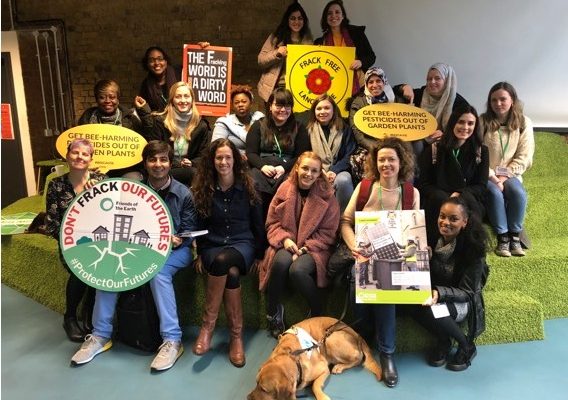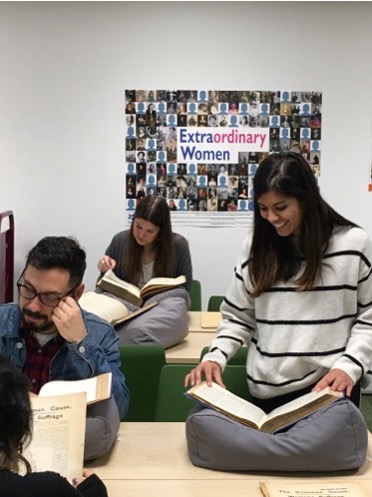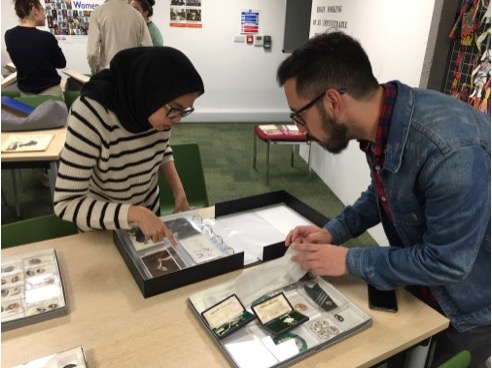Our Media, Campaigning and Social Change MA is a one-of-a-kind postgraduate course that focuses on developing skills for analysing and creating social change campaigns, particularly in communications and media. This innovative course is also offered as a Postgraduate Diploma or Certificate and benefits from input by leading campaigners and communicators within London’s social change sector. Teaching on the course is provided by experienced professionals affiliated with Westminster’s Communication and Media Research Institute (CAMRI), a renowned centre for media and communication research.
We spoke with Course Leaders, Michaela O’Brien and Anastasia Kavada who founded the course, about their experience and why you should study the Media, Campaigning and Social Change MA at Westminster.
Can you tell us a bit about yourself?
Michaela: I started my career by spending 20 years working in charity and NGO campaign communications, before joining Westminster 12 years ago. I am now Head of the University’s School of Media and Communication as well as Co-Course Leader on the Media, Campaigning and Social Change MA. I love the teaching aspect of my role, partly because I think all managers should stay in touch with the ‘core business’ of their organisation, but mostly because of my passion for social justice and campaign communications, which has been the key motivator throughout my career. My degrees are a BA in Classics from Cambridge and an MA in Gender Studies from the University of Sydney; campaign communicators really do come from a very wide range of disciplines!
Anastasia: I am a Reader in Media and Politics at the Westminster School of Media and Communication. I earned a BSc in Marketing and Public Relations from the (then) Athens University of Economics and Business in Greece. Additionally, I hold an MA and a PhD in Communication from the University of Westminster. My research focus is on the impact of digital media on campaigning, democracy, and social change. Together with Michaela O’Brien, I co-founded the Media, Campaigning, and Social Change MA in 2014. I’ve also held roles as Deputy Director and Co-Director of the Communication and Media Research Institute (CAMRI), and as Co-Leader of the Arts, Communication, and Culture Research Community at the University of Westminster.
What do you think makes the Media, Campaigning and Social Change MA at Westminster stand-out?
Michaela: The MA is distinctive in its blend of theory and practice. Our students not only learn to design campaigns practically but also explore broader theories such as storytelling, theories of change, and the values that underpin effective communication. They can choose between a traditional academic dissertation and a professional project, ensuring a well-rounded experience. This integration of theory and practice is woven throughout our curriculum, a fundamental aspect of our teaching philosophy.
Our Campaigners Panel, comprising organisations like Amnesty UK, Friends of the Earth, and the National Council for Voluntary Organisations (NCVO), helps us stay aligned with industry advancements. We host guest speakers from the field, co-organise events with industry partners, and facilitate paid work placements for students, leveraging our London location where many Third Sector organisations are based.
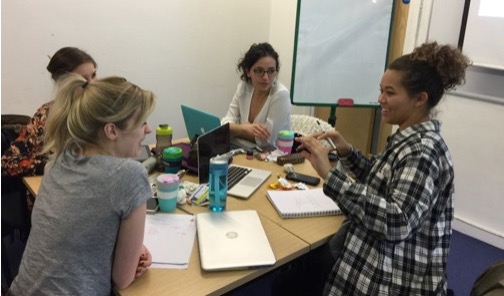
Anastasia: A decade after starting this degree, I believe it remains a one of its kind course, combining a focus on campaigning with a solid foundation in media and communication studies. When I developed this degree together with Michaela O’Brien we envisioned the skills and knowledge necessary for future “campaign communicators” – a role that’s increasingly prevalent in the industry. We integrated insights from both academic and practitioner literature, bridging disciplines that often remain separate. Our interdisciplinary approach draws on media studies, politics, sociology, psychology, and international relations, enriching our modules with diverse perspectives.
Can you tell us a bit about some of the graduate successes that have come from the Media, Campaigning and Social Change MA?
Michaela: Our thriving alumni community now includes professionals who work in major NGOs and charities across the world, such as Amnesty International, Change.org, Sightsavers, the Good Law Project, United Nations High Commission for Refugees, RSPCA, National Council for Voluntary Organisations (NCVO), Sarcoma UK, Campaign Against Living Miserably, The Fostering Network, Lever for Change, and Solar Aid. Other alumni work in communication or advertising agencies specialising in communication for social change, as well as in national and local government, trade unions and corporate social responsibility.
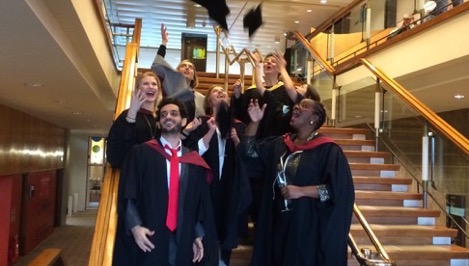
Anastasia: Some of our graduates have praised our MA for being life changing. For those with no experience in the industry, it offered them a footing to find employment in this field. For those with experience, it offered a boost in their career or the confidence to start their own organisation or consulting agency.
What would your advice be to aspiring communication professionals who would like to pursue a career within public sector, not-for-profit or non-governmental industries?
Anastasia: My advice would be to jump in and get involved! All not for profit organisations rely on volunteers and members – people willing to share their experiences and time, in order to reach organisational campaign and communications goals.
There are 100,000s of not-for-profit organisations globally working on issues from human rights to the environment, health to animal rights. Find a charity whose issue interests you, sign up for their email alerts, follow them on social media channels and get involved with some of their campaign communications. Sharing their social media posts, signing petitions and so on gives you an insight into how these organisations work and helps them too.
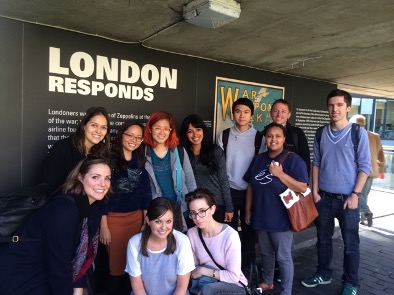
Michaela: There are various practitioner training events, peer learning and networking organisations like Charity Comms for example. I believe our Media, Campaigning and Social Change MA, PG Diploma or Certificate are a brilliant way into the sector. With both part-time and full-time study options, our course provides the flexibility to accommodate your circumstances. To learn more, feel free to explore our website, get in touch, or consider joining one of our upcoming open days.
Why did you choose Westminster?
Anastasia: I chose Westminster not only as a professional but as a student! I am a graduate of the Communication MA (class of 2002), an experience that inspired me to pursue a career in academia. Before that, I had envisioned myself as a campaigner or fundraiser for a charity or NGO. Westminster boasts a rich history in media and communication research, characterised by its deep political and social engagement. As the first university in the UK to introduce an undergraduate media degree, Westminster has established itself as a pioneer in this field. With a thriving and vibrant research and teaching environment, focused on the relationship between media and social change, Westminster is where I feel really at home.
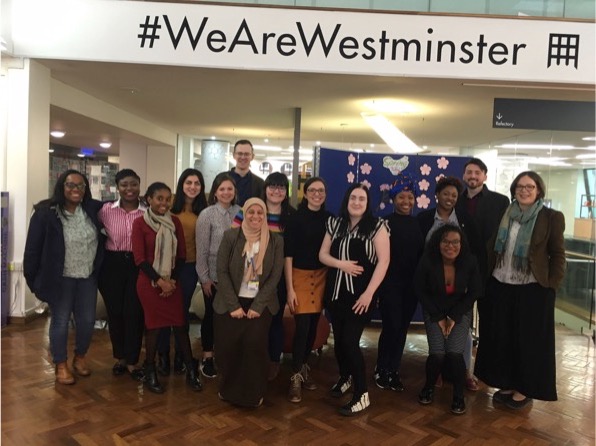
Your career has seen you occupy senior roles in both agency and in-house positions and the delivery of many successful campaigns. Could you tell us about one that stands out for you?
Michaela: It’s hard to choose one! I am particularly proud of the work I did as agency campaign lead with Carers UK, to run their Listen to Carers campaign from the agency side in the 90s. That campaign enshrined within law the right for carers to ask for respite care and other support – previously only the cared-for person themselves could ask for that support, and our research found that two thirds of carers were falling ill as a result for their responsibilities. In campaigning, some victories are temporary or can be undone, so permanent stepping stone achievements like this one are particularly resonant. But I am also very proud of the campaigning work I have done tackling domestic violence and racism, supporting social housing, and promoting gender equality, and of my volunteer work and activism, such as participating in the Greenham Common women’s peace camp as a student, and taking part in the non-stop picket outside the South African embassy in London during the South African apartheid regime.
Can you tell us about your area/s of expertise or interest?
Anastasia: My research investigates the role of digital media in campaigning for social change by a wide range of actors, including social movements, non-governmental organisations, charities, and grassroots groups. My focus rests on processes of organising, decision-making, mobilisation, storytelling, and collective-identity formation. A related strand of research revolves around alternative visions and practices of democracy produced by social movements. More recent work explores how care ethics, that centre around vulnerability and interdependence, can help us rethink democracy and the public sphere.
As a professional and academic working within the Media and Communication industries, what have been some of your career highlights?
Anastasia: Co-founding the Media, Campaigning and Social Change MA has been a career highlight. This is a unique course, that brings together theory and practice in distinctive ways. Teaching on this MA for the past decade has been very enriching.
Another career highlight was being awarded a Mid-Career Fellowship by the British Academy to study the role of digital media in the Occupy movement in the US and the UK. The study was expanded to other ‘movements of the squares’ after the 2011 wave of mobilisations. This has generated many academic journal articles and book chapters in edited collections, as well as theoretical reflections on the role of social media in the formation of counter-publics. A journal article on this theme, which I co-wrote with Professor Thomas Poell from the University of Amsterdam, was nominated for best article of 2022 by MECCSA (Media, Communication and Cultural Studies Association).
Michaela: Like Anastasia, I would say that launching the Media, Campaigning and Social Change MA with her is one of my main career highlights, alongside building the MA’s advisory panel of NGOs. We have an alumni network of more than 120 campaign communicators all over the world, making a positive difference in the world, and that makes me extremely proud.
Another highlight is the work I have led in our School refreshing and rewriting our curriculum across the 7 BAs and 15 MAs we offer, to ensure not only that our courses reflect the latest changes in technology and industry, but also to embed within them a decolonising approach to media and communication, with equality, diversity, and inclusion at their heart.
About Westminster
As one of the most diverse universities in the UK, we are a global university with London energy, with more than 19,000 students from 169 countries. Visit our website to find out more about our Media and Communication courses
- MORE 2025: Showcasing the Future of Architecture and Cities - October 27, 2025
- Opportunities at Westminster: My journey as a Student Ambassador - October 3, 2025
- OPEN 2025 Celebrating Talented Students - July 23, 2025
